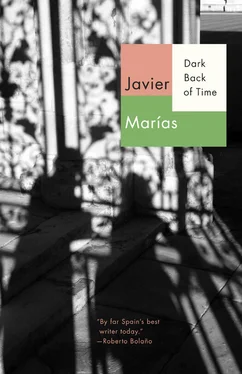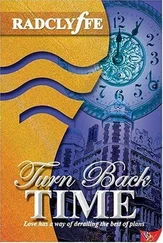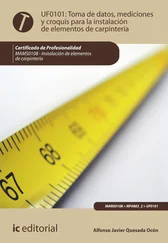And so I was only concerned with the possible reactions of three people to the as-yet-untitled book I was writing, which I referred to as “the Oxford novel” in my letters to Eric Southworth or Daniella Pittarello around that time. I made so bold as to guess what my Oxford friend Eric might think when he read the book and it caused me little apprehension, outside of his strictly literary assessment; and I saw no threat, either, in the probable reaction of Ian Michael, with his jocular, carefree outlook and his utter lack of piety, he’s the opposite of a stuffed shirt. As for the rest of my colleagues, more severe in appearance and more zealous on behalf of the good name of their profession, the University, and Oxford itself, I imagined that having dedicated a good part of their lives to teaching literature (even if it was Spanish or Latin American literature) they would be able, without doubts or difficulties, to distinguish between a work of fiction and a memoir or an essay, and not be upset by any brash digression or comical exaggeration or fabulation of mine with respect to a literary topos that only partially corresponded to the name of Oxford, which I gave it, and to characters that did not represent or caricature them or, of course, bear their names, even if they did occupy the same posts, just as the narrator occupied mine.
Toby Rylands’ reaction was of greater concern to me, because of what I’ve just said about him and because in no way would I ever want to incur his disapproval, especially not for a personal reason. So when I went to see him that summer of 1987 after my impatient sojourn in Cambridge — it wasn’t just the two of us at his house this time; we were invited, along with Eric, to Ian’s house for lunch in his garden — it seemed fitting to give him some advance notice, and not a bad idea to do so before two witnesses who could become allies or accomplices, if they weren’t already. I remember Toby, in a canvas deck chair that strained mightily beneath his corpulence, taking sidelong glances at the river and at us, his irises yellow under the stationary July sun, launching off quick anecdotes sharp as fencers’ thrusts or laughing in slow percussive bursts like pistons backfiring—“Ta, ta, ta”—each time Ian or Eric told him something racy or malicious. During a pause in the conversation when Ian had gone inside to see how his blind mother, with whom he lived, was doing, and to ask the maid to bring out dessert, I remarked (the river looked drowsy and dusty): “I don’t know if you know, Toby, that I’m writing a novel set here in Oxford.”
Toby Rylands looked surprised, so I was certain he must have heard something about it.
“Oh really? And what sort of novel is it? A roman à clef about all of us? Hmm. Should we be worried? Hmm. Should we be racking our memories? No, I knew nothing at all about it. Not a word,” he said, obviously exaggerating, and added with false petulance, “No one tells me a thing any more.”
That may well be the case these days — even retirement is far behind him now, along with his emeritus travels to the American universities that once reverently contracted his services and advice — he’s eighty-three years old now. But at that point ten years ago the opposite held true: everyone ran to tell him anything that stood a chance of amusing or interesting him, there are people to whom others tell things only in order to enter into their good graces and win their esteem or their indulgence, their telephones are forever humming.
“Well, I still don’t know exactly what kind of novel it will be, I don’t know much about my books until I’m done with them, and even then. But of course it won’t be a roman à clef about all of you, I don’t think my colleagues should worry about that. Though a few may insist on seeing it that way, nevertheless, or believe they recognize descriptions of themselves. You know how it is, the fact that I lived here will be enough to create suspicion, people always think we’re less imaginative, less capricious than we are. And the truth is that I wouldn’t like it if anyone were upset, I’m thinking especially of Alec, Fred and Pring-Mill, not so much of John or of you three, you’re more frivolous and I say that as a compliment. Philip certainly wouldn’t have worried me, either.”
Alec Dewar, that was the name I gave, in All Souls , to a character some people identified as the real person I will now, as with Rylands, call by his alleged fictional name and nicknames — the Ripper, the Inquisitor, the Butcher, the Hammer. Alec Dewar was a solemn man who strove to give the impression that he was severe and unyielding. In fact he seemed to me not to know what to do with himself after the close of the work day when the disappearance of the students (who enlivened him by irritating him) forced him to lay aside his role as ogre, and, cast out until morning, he would gaze nostalgically at the closed gates of the Taylorian; he appeared disconcerted by any foreign element in the stubborn routine of many, many years, and if you took an interest in him or asked him any question that was at all personal, as if he might have an existence beyond the university limits, he looked grateful and uncomfortable and immediately lost all his pomp and circumstance, answering timidly, but with the audacious expression of one who has done some extravagant thing, or as if he had been caught out in a gratifying fault. He liked to cultivate an appearance of ferocity and sarcasm and managed to be convincing to the students and the guests at seminars who underwent his scrutiny, but not to his colleagues who were sometimes the recipients of his creaky, hesitant attempts at being pleasant or even witty, which is one of the forms of cordiality in Oxford. His spoken Spanish was timid too, he preferred to speak English with me. Unaccustomed as he was to speaking of himself or of matters unrelated to work, he would, by the second or third exchange, begin to spout phrases that were part cliché and part enigma and that meant nothing. “So it goes in this day and age,” he would say without any particular meaning, after explaining, for example, that he didn’t have a house of his own in the city and slept in his rooms at his college, I don’t remember if it was Trinity or Christ Church or Corpus Christi. These phrases could bring the conversation to a dead stop, transforming his peevishness into a kind of helplessness that was embarrassing to see.
Fred Hodcroft, a charming man, very tall and slim with a woodpecker profile and a feigned air of professorial absent-mindedness, used to set grammatical and syntactic traps for me to test the extent of my knowledge, acting as if he really did not know the answers he was trying to extract from me. He was continually pushing his glasses back into place, as if he knew that a fall from his great height was sure to be fatal to them. He was so congenial that you could never let your guard down with him; his Spanish was excellent. He didn’t appear to be a devotee of the institution but he probably was, one of those men who can be offended for their entire life without anyone every learning of it or suspecting it: they are all affability, even with those they find reprehensible or who have done them a bad turn.
Robert Pring-Mill, stubby, clerical, and cagey, a close friend of Ernesto Cardenal, the revolutionary Nicaraguan poet-priest, lacked any sense of humor, or rather, his did not coincide with mine, and wary and severe as he was he used to take everything literally to a tedious degree. I didn’t see much of him, I don’t think he liked me, I was too indifferent to what he venerated: his trans-oceanic friendship must have been more sacerdotal than insurrectionist. His Spanish was excellent, but he tended to avoid speaking it. He seemed permanently displeased — they said he’d been hoping for the position that went to Ian Michaels, who, to make matters worse, wasn’t even from Oxford, and perhaps that alone explained why his figure seemed evasive and halfhearted.
Читать дальше












